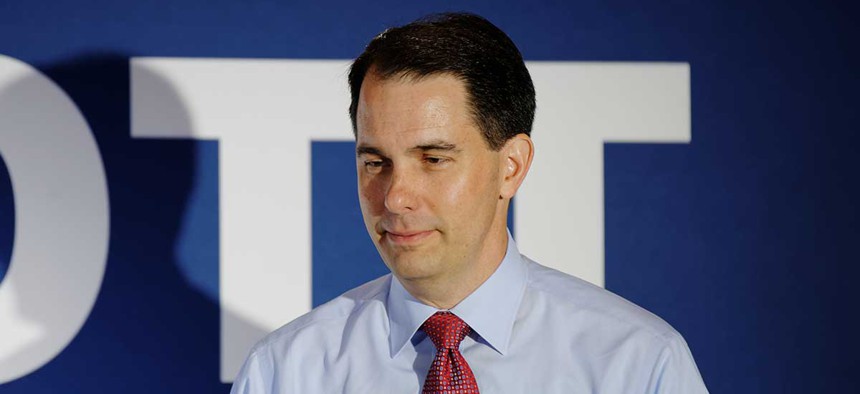
Flickr user Michael Vadon
Scott Walker, Not Paul Ryan, Could Be the GOP's Cleveland Surprise
After setting himself up as a kingmaker in Wisconsin, Walker could find himself on the throne at the convention.
The buzz surrounding Paul Ryan as a GOP presidential nominee hit a fever pitch this week, after Politico’s Mike Allen floatedthe possibility of the House speaker emerging at a contested convention. But in reality, the Republican more likely to prevail in such a scenario is another Wisconsinite: Gov. Scott Walker.
Ryan brings several undeniable assets to the convention as a possible sleeper nominee: He’s well-known nationally, has the ability to quickly raise funds for a general election, comes from a working-class background, and has ties to both the establishment and the conservative grassroots. But for all his talents, Ryan has several major vulnerabilities as a compromise nominee.
For better or worse, he’s an outspoken advocate of the elite Republican agenda of entitlement reform, free trade, and tax-code overhauls that many Donald Trump supporters have rejected throughout the primary process. Turning to a respected Hill insider like Ryan will hardly placate the Trump supporters; it’s more likely to infuriate them. And if you take Ryan at his word, he doesn’t even want to be president. “I think you need to run for president if you’re going to be president, and I’m not running for president,” Ryan told talk show host Hugh Hewitt on Monday.
Walker, by contrast, openly harbors national ambitions. As Politico’s Scott Bland reported, the governor has continued to raise money and travel through the 527 organization used for his presidential campaign. He’s maintained a busy schedule outside of Wisconsin, raising money for the party and recruiting future gubernatorial prospects as vice chairman of the Republican Governors Association.
Walker was painstakingly careful not to criticize Trump in his endorsement of Ted Cruz. It was a notable omission, since Walker’s original niche in the GOP field was as the candidate who could unite the blue-collar and white-collar wings of the party. He had used his cultural connections to win over blue-collar Republicans while touting executive experience and a record of busting government unions to win over upscale Republicans. His now-forgotten “shopping at Kohl’s” shtick on the campaign trail was a direct appeal to many working-class voters who have now sided with Trump.
With Trump suggesting that an outcome denying him the nomination is a usurpation of democracy, it’s also much easier to sell the broader public on nominating a Republican who participated in the presidential nominating process. Walker was a declared candidate for several months—and a perceived front runner—before dropping out in September 2015. It’s hard to see him turning down an opportunity to be nominated at a convention, given his long-standing interest in running for president.
Indeed, Walker conveniently predicted last week that an open convention would nominate a candidate who’s currently not running. When he dropped out of the race, he urged the party to coalesce behind a non-Trump alternative—a prescient call that few of his rivals heeded. It’s plausible that if his campaign had been better managed, and if he had demonstrated a better grasp of foreign affairs, he’d have been able to live up to his potential as the executive with working-class appeal.
After Trump’s decisive defeat in Wisconsin, it’s difficult to see how any Republican can clinch the nomination before Cleveland. Trump needs to win an outright majority of the vote in his home state of New York, sweep the Northeastern states in April, win Indiana’s pivotal May 3 primary, and finish strong in delegate-rich California. Cruz needs to demonstrate that his Wisconsin momentum translates into the Northeast, his most difficult region. John Kasich, who has no shot at winning a majority of delegates, simply needs to win somewhere outside of his home state to enter the convention with some momentum. The likelihood of stalemate has never been higher.
Cruz is currently lauding the breadth of his GOP support—getting Jeb Bush and talk show host Mark Levin backing the same candidate is one of his new favorite talking points—but he may soon find his newfound allies will become fair-weather friends if he can’t comfortably cobble together a majority of delegates at a convention. Even some of the uncommitted delegates whom Cruz’s campaign helped elect have said they’d consider other candidates after a first ballot.
But for another candidate to take advantage of convention chaos, it would take an outsider who would be an acceptable second choice for both Cruz and Trump supporters. Ryan is too much of a Washington insider. Mitt Romney is too close to the establishment. Marco Rubio is disliked by too many Trump supporters. Walker, who performed the feat of campaigning for Cruz while avoiding criticism of Trump, is one of the few Republicans left who fits the bill. Don’t be shocked if the candidate who played kingmaker in the Wisconsin primary could end up becoming king in Cleveland.
(Image via Flickr user Michael Vadon)







